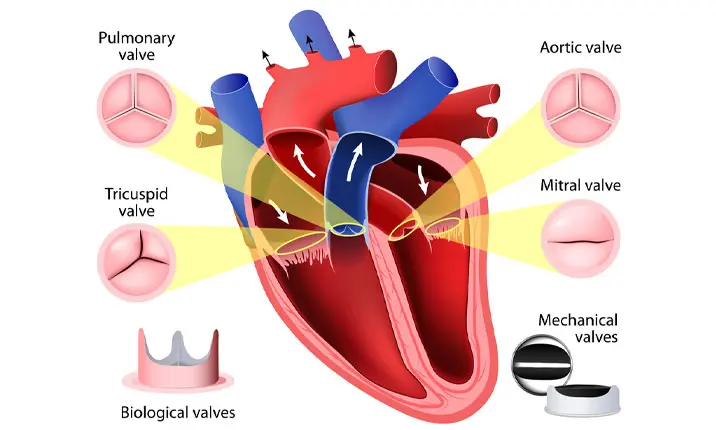Dr Paul Chiam, interventional cardiologist at Mount Elizabeth Hospital, talks about a minimally invasive approach to treating leaking heart valves.
Heart valve replacement surgery
For patients with heart valve disease, the main treatment option is usually heart valve replacement surgery. In a heart valve replacement surgery, the surgeon removes the damaged or diseased heart valve and replaces it with a prosthetic valve, restoring normal blood flow and function in the heart muscle.
There are 4 valves in the heart that work to keep blood moving through the heart in the right direction.
The mitral valve and tricuspid valve are located between the atria (upper heart chambers) and the ventricles (lower heart chambers).
The aortic valve and pulmonic valve are located between the ventricles and the major blood vessels leaving the heart, known as the pulmonary artery and the aorta.
When all 4 heart valves are working normally, blood always flows in one direction and there is no backward leakage.
Why do you need heart valve surgery?
Heart valve disease occurs when one or more of the heart valves do not open or close properly. If it is not treated, it can lead to more serious conditions, such as an enlarged heart or heart failure. There are several types of heart valve diseases:
- Valvular stenosis. Narrowing of the valve opening due to the stiffening of heart valves. This reduces the amount of blood that can flow through the valve.
- Valvular prolapse. In this condition, the valve flaps slip out of place or form a bulge causing improper closure of the valve. As a result, blood may leak backwards through the valve.
- Regurgitation. This happens when the valve does not close properly and allows blood to flow backwards. Regurgitation could be due to the prolapse of the valve or other causes.
Possible risks of heart valve replacement surgery
Valve repair or replacement surgery are generally safe. However, as with any procedure, there are risks of developing complications.
Possible risks of heart valve repair or replacement surgery include:
- Bleeding during or after the surgery
- Blood clots that can cause heart attack, stroke or lung problems
- Infection at the incision site or in the new valve
- Pneumonia
- Pancreatitis
- Breathing problems
- Abnormal heart rhythms
- Failure of the repaired or replaced valve to work correctly
What is keyhole surgery for heart valve repair?
Keyhole surgery can be performed on suitable candidates to repair or replace faulty heart valves. It is done using small incisions of about 3 – 4 inches long compared with traditional heart surgery, which uses 6 to 8-inch-long incisions.
Recovery time for keyhole surgery is usually shorter. It is also associated with a lower risk of bleeding and infection, and less pain.
Always speak to a cardiologist to find the right treatment for your heart condition.
Leaking heart valve treatment
In some patients, however, a gap can appear between the implanted prosthetic heart valve and the patient's own heart tissue due to a breakdown in the sutures that secure the valve in place. This can lead to a leakage of blood through the side of the implant. If left untreated, this may result in more serious complications like haemolysis (breakdown of red blood cells) or heart failure. Known as a paravalvular leak, this complication occurs in around 1 – 10% of valve replacement patients.
Previous treatment options were limited, often involving a repeat (and higher risk) open heart surgery to repair the paravalvular leak or to replace the prosthetic heart valve entirely.
In recent years, techniques have progressed, and a more advanced procedure known as percutaneous paravalvular leak repair has become more common, offering patients a minimally invasive approach for treating a leaking heart valve.
Percutaneous paravalvular leak repair
Percutaneous paravalvular leak repair surgery is performed via a small puncture in the groin, on a beating heart, without the need to open the chest to access the heart valves.
A small catheter is fed through an artery or vein in the leg to the heart where, with the help of a guidewire and advanced imaging, a 'plug like device' is deployed into the paravalvular leak to close the gap. The procedure requires the skill of a trained interventional cardiologist due to its technical complexity.
In a small number of patients, the leak cannot be closed due to problems with the guidewire's inability to cross the heart valve defect, and in these cases a more invasive approach is needed.
What is recovery like with keyhole surgery?
Compared to open heart surgery, a percutaneous paravalvular leak repair is performed in just a few hours and doesn't require a re-opening of the chest cavity. Recovery time is significantly shorter for patients undergoing a minimally invasive procedure, and many can be discharged the day after the procedure.
With an increasing number of patients with surgical valve replacements in the Asian region, the number of patients with valve leakage problems is expected to rise. These patients may benefit from the keyhole approach of percutaneous paravalvular leak repair surgery.
If you've concerns about your heart health, it is good to go for regular heart screening to identify early heart disease risks.
You can also make an appointment with a heart specialist to learn more about your condition, and to find the right treatment for you.













